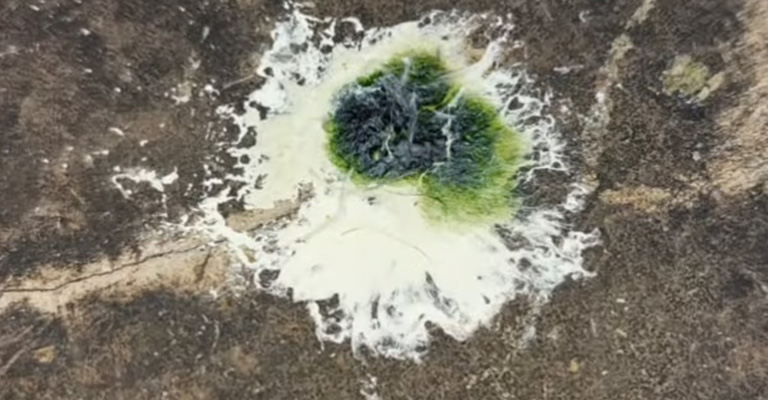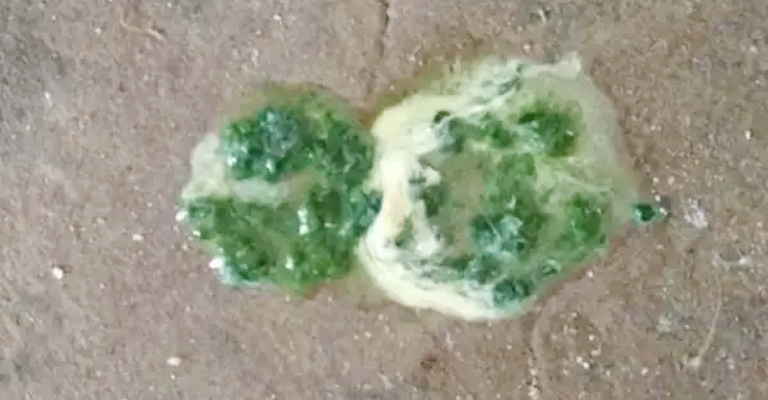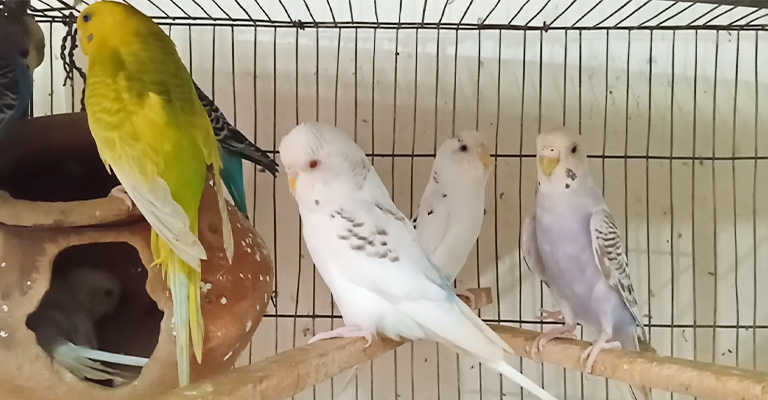Parakeets are beloved pets known for their vibrant plumage and cheerful personalities. However, if you notice your feathered friend’s droppings taking on a green hue, it may be cause for concern. Green poop in parakeets can indicate underlying health issues or dietary imbalances.
Parakeet green poop can be caused by the food it’s eating. The colour can also result from a diet change, medication, or liver problems. In some cases, stress and infections can cause green poop in Parakeets.
Explore the causes, symptoms, and solutions for green parakeet poop. We will also provide some essential information to help you ensure the well-being of your cherished pet.

Why Do Parakeets Poop Green?
Parakeet droppings typically have a combination of green, white, and black colours. The colour variations result from different components of the waste being expelled. However, an excessive amount of green in the droppings could indicate various factors, such as:
Diet
Parakeets with a diet rich in chlorophyll-containing foods, such as leafy greens or vegetables, can have green droppings. A change in the diet, mainly if it includes high amounts of green-coloured foods like leafy vegetables or artificial colourants, can lead to green droppings.
Seed Mixtures
Some seed mixtures designed for parakeets may contain ingredients with green pigments, which can contribute to the colour of their droppings.
Fruits and Vegetables
Feeding parakeets fruits and vegetables like broccoli, spinach, or peas can result in green droppings due to chlorophyll.
Food Coloring or Additives
A parakeet consuming foods or treats with artificial dyes or additives may lead to temporary green colouration in its droppings.
Medications or Supplements
Certain medications or supplements given to parakeets, particularly those containing iron or other compounds, can cause changes in the colour of their droppings.
Illness or Digestive Issues
In some cases, digestive disorders or underlying health issues in parakeets can lead to changes in the colour of their droppings, including green colouration.
Bacterial or Parasitic Infections
Infections in the digestive system of parakeets can cause alterations in the colour of their droppings, including green discolouration.
Infections affecting the gastrointestinal tract can cause changes in the colour of the droppings.
Liver or Gallbladder Issues
Like other illnesses, liver or gallbladder problems can interfere with bile’s normal digestion and metabolism, leading to green-coloured droppings.
Stress or Environmental Factors
Parakeets may experience changes in their droppings due to stress, such as moving to a new environment, changes in routine, or exposure to unfamiliar stimuli.
Poisoning
Ingestion of toxic substances can result in abnormal stool colouration. It’s important to remember that any significant or persistent changes in the colour, consistency, or frequency of a parakeet’s droppings should be evaluated by a veterinarian to ensure their health and well-being.
Healthy Parakeet Poop
Healthy parakeet poop typically has the following characteristics:
Size
Parakeet droppings are usually small and round. They should be well-formed and maintain their shape after the bird defecates.
Colour
Healthy parakeet droppings typically consist of three parts: a dark green or brown solid faecal portion (the waste from the digestive system), a white or slightly off-white urate portion (a concentrated, pasty substance that contains uric acid), and a clear liquid (urine). The exact shades of green or brown can vary based on the bird’s diet.
Consistency
The faecal portion of the droppings should be firm and well-shaped, not too wet or too dry. It should hold together and not be overly runny or watery.
Regularity
Healthy parakeets should have regular bowel movements. They may poop several times a day, and the consistency and colour of their droppings should remain relatively consistent, with minor variations due to diet changes.
No excessive mucus or blood
There should be no signs of excessive mucus, blood, or unusual substances in the droppings. Any abnormalities in the droppings should be investigated by a veterinarian.
Parakeet Green Poop Additional Symptoms

Identifying the symptoms and implementing appropriate solutions can help prevent green poop in parakeets. Some common symptoms to watch for include:
- Changes in droppings’ colour, consistency, or frequency.
- Lack of appetite or reduced food consumption.
- Weight loss or gain.
- Lethargy and decreased activity levels.
- Feather plucking or dull and dishevelled appearance.
- Regurgitation or vomiting.
- Abdominal discomfort or bloating.
- Behavioural changes or increased aggression.
How to Prevent Green Poop In Parakeets? – Solutions
To prevent green poop, consider the following solutions:
Maintain a Balanced Diet
Provide a well-balanced diet for your parakeet, consisting of high-quality commercial bird food formulated specifically for parakeets.
This food should contain a mix of seeds, pellets, and fresh fruits and vegetables. Ensure that the diet includes a variety of coloured fruits and vegetables to promote overall health.
Gradual Dietary Changes
If you plan to introduce new foods to your parakeet’s diet, do so gradually. Birds have sensitive digestive systems, and sudden dietary changes can upset their stomach and lead to green poop.
Introduce new foods slowly, offering small portions at first and gradually increasing the quantity over time.
Regular Veterinary Check-Ups
Schedule regular check-ups with an avian veterinarian for your parakeet. A veterinarian can assess your bird’s overall health, provide guidance on diet and nutrition, and detect any potential health issues before they become more serious. Regular check-ups are essential for maintaining your parakeet’s well-being.
Prevent Exposure to Toxins and Parasites
Ensure that your parakeet’s environment is free from toxins and potential sources of contamination. Keep their living area clean and sanitized, avoiding the use of harmful chemicals or pesticides that can be toxic to birds.
Take measures to prevent parasites, such as mites or worms, from infesting your parakeet’s environment by regularly cleaning and disinfecting their cage and providing appropriate veterinary-recommended preventive treatments.
Monitor Stress and Environmental Factors
Parakeets can be sensitive to stress and environmental changes, which can affect their digestive system. Provide a calm and comfortable environment for your parakeet, away from loud noises, excessive handling, or other stressors.
Ensure that they have access to fresh air and natural light, as well as appropriate cage sizes, perches, and toys for mental stimulation.
Hydration and Clean Water
Ensure that your parakeet has access to clean and fresh water at all times. Proper hydration is essential for maintaining a healthy digestive system and preventing digestive issues that can lead to abnormal poop colour.
How to Take Care of A Parakeet That’s Pooping Green?

If your parakeet is already experiencing green poop, you can take specific steps to provide optimal care. Taking care of a parakeet that’s pooping green requires a few considerations to ensure the bird’s health and well-being. Here are some guidelines to follow:
Observe and Monitor
Keep a close eye on your parakeet’s droppings to confirm if they are consistently green. Monitor your bird’s behaviour, appetite, and overall health for other signs of illness or distress.
Consult A Veterinarian
It is crucial to consult an avian veterinarian if you notice consistent green droppings in your parakeet. An avian vet can conduct a thorough examination and provide an accurate diagnosis.
Dietary Adjustments
Evaluate your parakeet’s diet and ensure it includes a variety of fresh fruits, vegetables, and high-quality pellets or seeds. Introduce dark, leafy greens like spinach or kale to the diet, which can help regulate the digestive system and improve droppings.
Hydration
Ensure your parakeet has access to clean, fresh water at all times. To promote hydration, consider offering fruits with high water content, such as melons or cucumbers.
Environmental Factors
Assess the parakeet’s living conditions, including the cage, temperature, and lighting. Provide a comfortable and stress-free environment, as stress can impact a bird’s digestive system.
Regular Cleaning
Maintain a clean cage and regularly remove any soiled bedding or droppings. This helps minimize the risk of bacterial infections and promotes overall cleanliness.
Avoid Harmful Substances
Ensure your parakeet is not exposed to toxic substances like pesticides, cleaning chemicals, or cigarette smoke, as they can adversely affect the bird’s health and digestive system.
Remember, these guidelines are general advice, and it’s essential to consult a veterinarian for accurate diagnosis and personalized care for your parakeet. They can provide specific recommendations based on your bird’s health and condition.
FAQs
Parakeet poop can turn green due to several factors, including diet, stress, illness, or changes in the bird’s environment. The colour of the droppings is often influenced by the food they consume, such as leafy greens or food colouring additives.
Green droppings can indicate an underlying health issue but do not always signify a serious problem. If the green colour is accompanied by other symptoms like changes in behaviour, reduced appetite, or weight loss, it’s essential to seek veterinary advice.
Yes, adjusting the diet can sometimes help resolve green droppings. Introducing more fresh fruits, vegetables, and leafy greens can improve the bird’s digestive health and normalize the colour of the droppings. However, it’s advisable to consult a vet before making significant dietary changes.
Occasional variations in droppings’ colour are generally not a cause for concern, as dietary changes or food additives can influence them. However, if there are consistent changes in the droppings or other symptoms are present, it’s advisable to consult a veterinarian for further evaluation.
It is recommended to seek veterinary care if your parakeet’s droppings are consistently green and are accompanied by other concerning symptoms, such as changes in behaviour, appetite loss, weight loss, or signs of distress. A veterinarian can thoroughly examine and provide appropriate treatment or advice based on the bird’s condition.
Final Words
That was all about Parakeet green poop. As discussed, green poop in parakeets can indicate various factors, including diet, stress, illness, or environmental changes.
While occasional variations in droppings’ colour may not be a cause for concern, consistent green droppings accompanied by other symptoms should prompt a visit to an avian veterinarian for evaluation.
Maintaining a balanced diet, providing a clean and stress-free environment, and consulting a professional for accurate diagnosis and personalized care are essential.